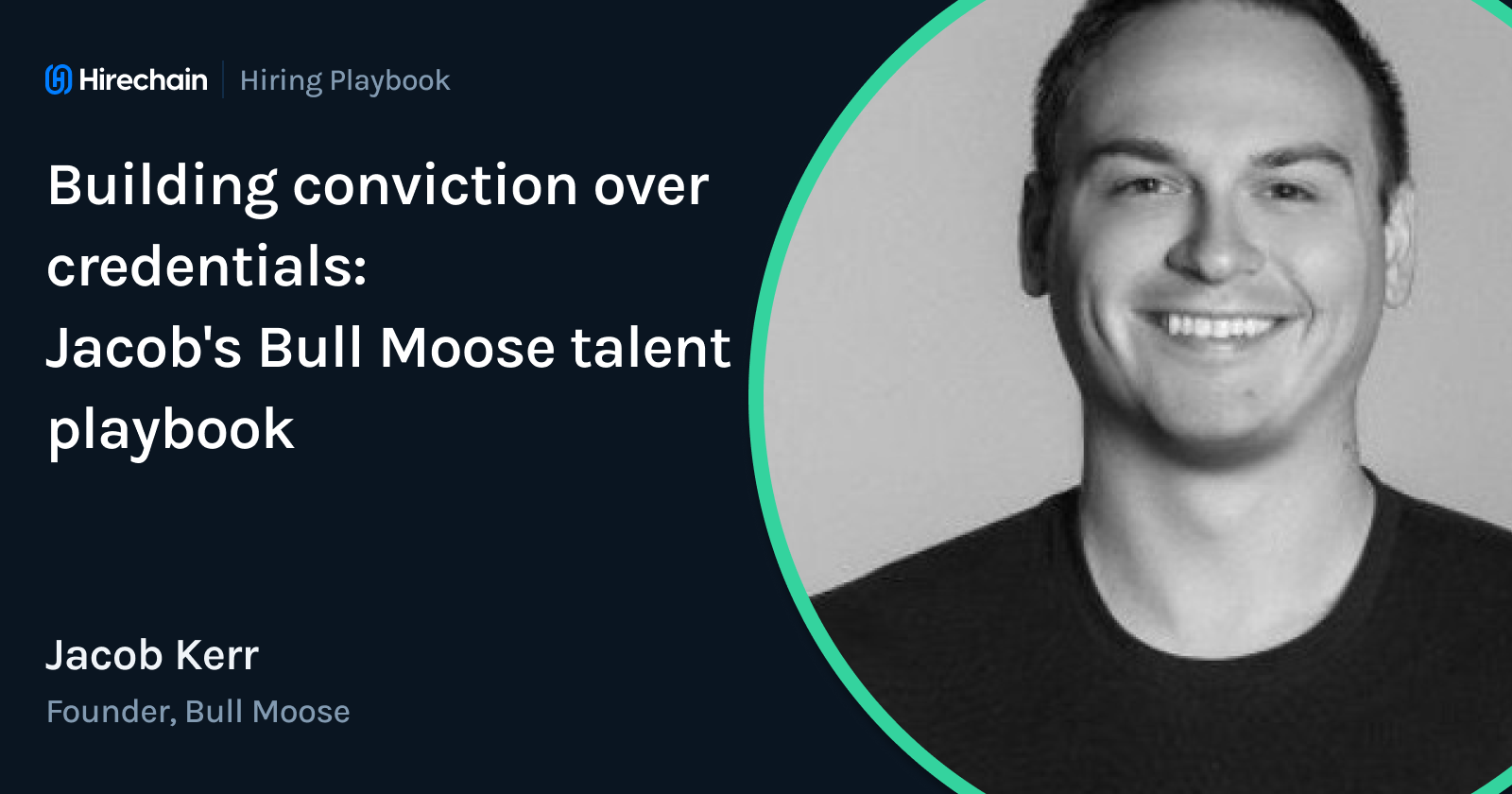Meet Jacob Kerr

Jacob Kerr runs Bull Moose, a retained talent services firm that combines recruiting, executive search, and consulting with strategic investing. He previously was a recruiter at Paradigm during the rise and fall of crypto in 2022, and supported Jump Trading and 0x Labs before that. His philosophy: most founders fail at hiring because they aren’t strategic or intentional about recruiting, instead brute-forcing volume without a calibrated process, chasing pedigree over problem-solving fit, and delegating the work that defines their culture.
Core belief: Real recruiting is hiring people who are not obviously great on paper and setting them up for success.
Key Takeaways
Process beats volume—build systems that solve your pain.
Most founders think recruiting is a numbers game. Jacob disagrees. The real problem isn't finding more candidates—it's forcing huge volumes of people through broken processes that can't identify or sell elite talent.
"If you are just shoving people into a poorly-designed, clunky process that is not calibrated and not structured, 1) you’re not effectively evaluating, 2) you’re not selling elite talent and (3) you’re wasting time, energy and money."
His framework starts with outcome-first thinking:
- Define your talent strategy before you start sourcing
- Work backwards from business problems to required skills
- Build calibrated evaluation before scaling top-of-funnel
- Target 5 people in final rounds for quality hiring decisions
Elite recruiting math: One hire might need ~200-300 outreach messages, assuming 5% interest rates. But for specialized roles, Jacob's team has made hires with as few as 5-10 highly-targeted emails when the process is dialed in.
Founders must own recruiting—delegation is startup suicide
The biggest mistake Jacob sees: founders treating recruiting like a side project that can be fully delegated.
"Recruiting is a team sport. If you, as the founder, are just delegating away all of the legwork... You are going to fail. There's just no way around it. Zuck is texting candidates to try to join Meta. If Zuck is doing it, what the hell are you doing?"
How elite founders stay involved:
- Take first screens with candidates to calibrate with the recruiting team
- Review profiles, GitHubs, and papers together with recruiters
- Do midway check-ins and final closing meetings with candidates
- Spend 30-50% of time on recruiting in the early stages
The transition moment: "At a certain point, their job changes from building the tech or building the product into building the organization."
Anti-pedigree recruiting—lazy hiring (checkbox recruiting) kills startups
Everyone wants the Stanford grad who worked at Coinbase for 3-4 years, got several quick promotions, and is now a fast-rising staff engineer. Jacob calls this “checkbox pedigree recruiting.”
"Everyone can find that profile on LinkedIn, but #1) why would that person work with you, and #2) that person with pedigree might not even be successful at a startup. They’re so hard to hire and they and they're not always the right fit anyway.”
Better approach: systematic archetype testing
- Map different candidate profiles with associated trade-offs
- Test multiple archetypes through your interview process
- Use data to see which profiles actually perform vs. look good on paper
- Work backwards from problems you're solving to skills you need
Case study: For a Head of Product search, the team wanted pedigree across the board. Jacob's team tested Web2 PMs who had led large developer platform companies (e.g. Stripe), crypto-native PMs from blue chip startups who were scrappy and technical, senior PMs with strong TradFi experience, and hybrid profiles that combined elements of each. The winning hire was someone who'd led small teams at a large fintech, done zero-to-one work at a crypto exchange, and had strong mission alignment — not the original highly pedigreed archetype that was initially requested.
Archetype framework—systematic recruiting that scales
Instead of hoping for unicorns, Jacob maps candidate archetypes with clear trade-offs, then tests what actually works.
"Every hire is choosing a set of trade-offs. We're choosing a set of strengths and weaknesses and human characteristics."
His process:
- Define 3-4 candidate archetypes for each role
- Calibrate with the hiring team on trade-offs for each archetype
- Run structured interviews across all archetypes
- Use interview performance data to refine which profiles work and which don’t
- Choose based on business needs, not resume prestige
Example archetypes for blockchain engineers: "Web2 infrastructure expert," "Crypto-native builder," "Academic researcher turned practitioner." Each has different strengths, weaknesses, and sourcing strategies.
Define your employer value proposition—and be honest about trade-offs
Most founders can't articulate why someone should join their company beyond generic startup talking points. Jacob forces clarity.
"Your company has a value prop to talent. And you should write down what are all the pros and cons of your company value prop."
His framework covers:
- Work they'll do (technical challenges, growth opportunities)
- Leadership and culture (decision-making speed, autonomy levels)
- Compensation (cash, equity, token, benefits)
- Lifestyle (remote vs. in-person, work-life balance expectations)
The honesty test: "I can just be upfront and honest about that. If you want to opt into this, that's great. Let's move forward. If you don't, also great. Let's just call it for what it is right now. That value prop will resonate with the right person and it won’t resonate with the wrong person, and we can test it along the way.”
Company builder transition—managing your own psychology
The hardest part of scaling isn't hiring—it's founders evolving from product builders to company builders.
"Really good founders are ones that are very confident, opinionated, and self-assured. They’re also humble, open-minded, and coachable. Kind of an oxymoron on all levels."
What separates successful transitions:
- Self-awareness of strengths and weaknesses
- Surrounding themselves with experts who they encourage to push back
- Knowing when to listen to advice and when to override it
- Managing personal psychology as the job fundamentally changes
Elite insight: One founder reframed his entire approach: "We have a great team that can build, so I’m no longer coding. My job is to make really good decisions. And upstream of good decisions is good sleep. So my job now as a founder is to get good sleep. I can’t make good decisions for the rest of the company without good sleep."
Metrics that matter
Early-stage recruiting health:
- Time from first call to decision (target: under 3 weeks)
- Final round conversion rate (5 final rounds should yield 1 hire)
- Interest rate on outreach (5% baseline for most engineering roles)
Process calibration signals:
- Pass-through rates between stages (50% is a good target)
- Quality of "strong yes" signals vs. lukewarm responses
- Archetype interview performance data vs. initial assumptions
Culture and alignment indicators:
- Referral quality and conversion rates
- Candidate excitement about problems vs. just compensation
- Learning from every hire, including wrong ones
Key takeaways
✅ Build process before pushing volume: Calibrated evaluation systems beat brute-force sourcing every time.
✅ Founders can't outsource culture decisions: Stay involved in first screens, final rounds, and everything that defines who you become.
✅ Pedigree is a lazy shortcut: Find people who aren't obviously great on paper but solve your actual problems.
✅ Test archetypes systematically: Map candidate profiles, test trade-offs, use data to refine what actually works.
✅ Define and defend your value prop: Know what you're selling, who it resonates with, and be honest about trade-offs.
Pro tips
💡 Referrals won't happen if your team's unclear or uninspired: Make the bar clear, make it easy, and follow up religiously.
💡 External founder consultation works: Bring in founders who've held similar roles to advise on search strategy and selling approach.
💡 Elite closing requires in-person time: Top founders fly to meet final candidates or bring them in for face-to-face meetings.
💡 Equity alignment changes everything: Trading some recruiting fees for equity in clients creates better long-term partnership than pure cash relationships.
Day one actions for founders
□ Define your outcome-first hiring strategy - Work backwards from business problems to required skills and candidate archetypes
□ Map your employer value proposition - Document what you're selling across work, leadership, culture, and compensation dimensions
□ Build your calibrated interview process - Create structured evaluation before turning on candidate sourcing
□ Block up to 50% of founder time for recruiting - Make recruiting a core function, not a side project you delegate
□ Test multiple candidate archetypes - Don't just chase pedigree—systematically test different profiles and use data to refine
Need help hiring crypto talent? Post a job on Hirechain for free and get pre-qualified candidates that are worth your time.



